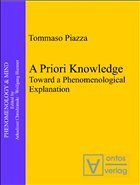The book sets out to analyze the notion of a priori justification and of a priori knowledge. The most influential explanations of the a priori within the contemporary analytic tradition are analyzed. It is shown that the theories which group around the notion of implicit definition ultimately entail that the propositions which can be known a priori are to be analyzed along conventionalist lines. It is argued that the notion of objective a priori knowledge requires a commitment to the existence of a faculty which is the source of and justifies that kind of knowledge. The existence and functioning of this faculty cannot be explained within a strictly naturalistic set of constraints. Attention to the phenomenology of justification (validation) both of observational and purportedly a priori statements however reveals that the naturalistic demands are based on an asymmetry thesis among perception (and credited genuine sources of justification) and rational insight which is false. Therefore it is argued that a corresponding symmetry thesis must be accepted, according to which rational insight should be regarded as a justification-conferring faculty. In the final part of the book it is argued that Husserl’s conception of the analytic/synthetic distinction, and of concept constitution, allow for an objective interpretation both of analytic and synthetic a priori knowledge.
Table of contents:
Introduction
1. A Priori, Analyticity, and Implicit Definition
Empiricism, Analyticity, and the A Priori
Reductive and Non-Reductive Conceptions of Analyticity
Implicit Definition, Logical Truth, and the Recalcitrant A Priori
Problems with Implicit Definition
BonJour’s Objection
Fodor and Lepore’s Objection
Horwich’s Objection
Hale and Wright’s defence of the traditional connection
Logic and Convention
Coda
2. Realism about Logic
Introduction
Logical Principles, Justification and Epistemic Relativity
Objective Truth
Resnik’s Attack
Wittgenstein on the necessity of ‘1 inch = 2.54 cm’
and logical inference
Dummett’s Objection
Rule Following considerations and the adoption of a convention
Summarising Remarks
Wright’s Attack
3. Objective Knowledge
Introduction
What the Tortoise Said to Boghossian
What Boghossian would say to the Tortoise
Rule-circular Arguments
The Side-Argument
Rejecting the Side-Argument
First Horn: Simple Internalism and Rational Insight
Second Horn: Epistemic Responsibility and the Lack
of Epistemic Irresponsibility
Realism, the A priori and Rational Insight
Boghossian’s Argument against Relativism
Epistemological Realism about Justification
Conclusion
4. Phenomenology and Rational Insight
Naturalism and Justification
Phenomenology, Justification, and Eidetic Seeing
Is Holism a Possibility for the Empiricist?
Intuition of Essences and the Analytic/Synthetic Distinction
Husserl’s Conception of the Analytic/Synthetic Distinction
Eidetic Variation
Passive synthesis and Concept Constitution
Knowledge of Reality and Conceptual Truth
Absolute vs Relative Objectivity
Are Conceptual Truths True?
Conclusion
References
Table of contents:
Introduction
1. A Priori, Analyticity, and Implicit Definition
Empiricism, Analyticity, and the A Priori
Reductive and Non-Reductive Conceptions of Analyticity
Implicit Definition, Logical Truth, and the Recalcitrant A Priori
Problems with Implicit Definition
BonJour’s Objection
Fodor and Lepore’s Objection
Horwich’s Objection
Hale and Wright’s defence of the traditional connection
Logic and Convention
Coda
2. Realism about Logic
Introduction
Logical Principles, Justification and Epistemic Relativity
Objective Truth
Resnik’s Attack
Wittgenstein on the necessity of ‘1 inch = 2.54 cm’
and logical inference
Dummett’s Objection
Rule Following considerations and the adoption of a convention
Summarising Remarks
Wright’s Attack
3. Objective Knowledge
Introduction
What the Tortoise Said to Boghossian
What Boghossian would say to the Tortoise
Rule-circular Arguments
The Side-Argument
Rejecting the Side-Argument
First Horn: Simple Internalism and Rational Insight
Second Horn: Epistemic Responsibility and the Lack
of Epistemic Irresponsibility
Realism, the A priori and Rational Insight
Boghossian’s Argument against Relativism
Epistemological Realism about Justification
Conclusion
4. Phenomenology and Rational Insight
Naturalism and Justification
Phenomenology, Justification, and Eidetic Seeing
Is Holism a Possibility for the Empiricist?
Intuition of Essences and the Analytic/Synthetic Distinction
Husserl’s Conception of the Analytic/Synthetic Distinction
Eidetic Variation
Passive synthesis and Concept Constitution
Knowledge of Reality and Conceptual Truth
Absolute vs Relative Objectivity
Are Conceptual Truths True?
Conclusion
References
